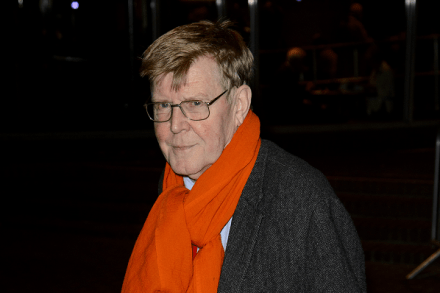Books and arts – 12 March 2015


The good, the bad and the ugly in books, exhibitions, cinema, TV, dance, music, podcasts and theatre.
The figure in the shadows stared at Eve And shook the beans inside the bag. ‘Believe Me, crops of serpentini beans achieve A growth of two feet, even more, no lie.’ Eve, flattered by him, looked and gave a sigh. He rattled them and said, ‘Give them a try…’ ‘Perhaps I could be tempted…’ Blushing
The spectre of the Charlie Hebdo killings still hangs over Paris. Outside the École Nationale Supérieure des Beaux-Arts, opposite the Louvre, there’s a big poster of Cabu, one of the murdered cartoonists. The poster is peppered with fake bullet holes; underneath, the caption reads, ‘It doesn’t hurt at all.’ I didn’t realise, until I talked

Charles Lutwidge Dodgson loved little girls. He loved to tell them stories, he loved to feed them jam, he loved to set them puzzles, and he loved to take their photographs. On 25 March, 1863, he composed a list of 107 prepubescent portrait subjects, arranged alphabetically by forename. Below the Agneses came the Alices, including

After a month cooped up in a Scottish castle, no internet, no TV, and no radio, watching hectic snowflakes billowing through the wooded hillside opposite my window, I realise that what I’ve missed most about this supposed deprivation has not been the news (to which I thought I was addicted) or the chatter, the company


One of last year’s unexpected treasures was a novelty show by Defibrillator that took three neglected Tennessee Williams plays, all set in hotel rooms, and staged them in suites at a five-star dosshouse in central London. The Langham Hotel, an antique hulk of marble and glass overlooking Broadcasting House, is justly proud of its raffish

By my calculations, the remake of Poldark (BBC1, Sunday) is the first time BBC drama has returned to Cornwall since that famously mumbling Jamaica Inn — which may explain why even the lowliest yokel here tends to project from the diaphragm. Leading both the cast and the diaphragm-projection is Aidan Turner as Ross Poldark, initially

Suite Française is being billed as a second world war romance about ‘forbidden love’ and, in this regard, it is handsome, solid, well played and probably fine, if you haven’t read Irène Némirovsky’s novel, but if you have? Then you may have been hoping and praying for something deeper, something more special. As you know

In 2011, Anders Breivik murdered 69 teenagers in a socialist summer camp outside the Norwegian capital of Oslo, and eight adults with a bomb attack. His hatred was directed at the children of Norwegian politicians who had allowed immigration to contaminate the sturdy bond (as he saw it) of Nordic race and nationhood. ‘You will

Anthony Quinn’s fourth novel, set in London’s artistic and theatrical circles in 1936, is not the kind in which an anguished protagonist sits in lonely contemplation for 80 pages at a stretch. It moves along at a clippy pace, introducing us to a succession of appealing characters and throwing in a lurid murder for extra
I’m not sure I know what the mark of merit is in a first novel, any more than in a fourth or a 14th. If nothing else, though, it’s surely an opportunity to make a new friend, to lock eyes with a stranger across a crowded room. So it was, one enchanted evening in February,

John Aubrey investigated everything from the workings of the brain, the causation of winds and the origins of Stonehenge to how to cure the fungal infection thrush by jamming a live frog into a child’s mouth (you hold it there until it — the frog — suffocates, then replace it with a fresh frog). He

A few months ago I went to a lunch at Univ, my old college in Oxford, to celebrate the 95th birthday of my Ancient History tutor George Cawkwell. There were toasts and speeches, including one from George himself and my fellow student Robin (now Lord) Butler, who did a brilliant imitation of George getting all

Although the young women of the 1950s hovered on the cusp of change, many did not know it. Valerie Gisborn was the exuberant 15-year-old daughter of ‘a sharp-tempered, anti-social’ mother riddled with ‘neurotic restrictiveness’. But Valerie had fallen in love. She had met Brian in 1949 at the local ballroom in Leicester, her sole permissible


‘Sometimes, strolling through the ruins of earlier civilisations, we idly wonder what it must have been like to live through the end of one of them,’ writes Ferdinand Mount at the end of The Tears of the Rajas. ‘Now we know for ourselves.’ This is a long, wonderfully discursive and reassuringly old-fashioned book which tells

In this autobiography, Mary Portas doesn’t dip into the fabled store of her talents by giving an account of her countrywide progress as monarch and oracle of retail, but conjures a nostalgic cornucopia of the mid- 20th-century brands and frankly cheesy TV personalities (she often dressed up as Jimmy Savile) that dazzled her youthful Hertfordshire

Books ought to be able to stand on their own, but perhaps it is important to know this about David Vann: a year after his stepmother’s mother had shot her husband and herself, his father also shot himself. Vann was 13 years old. The reason it’s important to know this is that what might seem
Alan Bennett announced on Radio 4 last week that ‘hypocrisy’ is the defining characteristic of the English. ‘In England, what we do best is lip service,’ he sighed, before going on to admit that even he is a hypocrite. While many have taken issue with his claim, Mr S was reminded of Bennett’s words on a recent

Was intimacy the goal of Björk at MoMA? Co-curated by the Icelandic musician herself and Klaus Biesenbach, MoMA chief curator at large, the exhibition allows for a closer look at the objects that go into her productions, from custom-made instruments to haute-couture costumes and personal notebooks. The centrepiece, however, is the new commission Black Lake.

In 1977 a journeyman actor called Brian Kelly optioned a science-fiction novel called Do Androids Dream of Electric Sheep? The book’s author, Philip K. Dick, had been writing science fiction since the early 1950s. He was 49 years old, with 30 novels behind him. He had a cult reputation, but he barely scraped a living.

When it was suggested that a huge exhibition of Impressionist paintings should be held in London, Claude Monet had his doubts. Staging such an exhibition, he wrote to his dealer Paul Durand-Ruel, would be ‘unwise’ and only likely to baffle a London public that ‘knows very little about us’. That was in 1904. What, one

There is good art, there is mediocre art and there is bad art. In the same ratio – about 3:65:32 – there is good political art, mediocre political art and bad political art. There is also a slender sub-genre of this last category, known as so-bad-it’s-good political art. And of this, I am a connoisseur.

Things have not been happy at Tate Britain for some time. Last year Waldemar Januszczak wrote an article culminating with this cri de coeur: ‘Curtis has to go. She really does.’ The meat of the argument against Tate Britain’s director was that she had presided over a run of misconceived exhibitions disliked as much by

The aching hum of crickets. The susurrus of reeds. The lapping of waves. The unmistakable noise of a sound technician ripping a duster in two as the heroine’s dress was torn, thuggishly, by a character in the heat of passion… The sound effects for Harold Pinter’s adaptation of Joseph Conrad’s Victory (which started life as


My favourite bit of The Great European Disaster (BBC4, Sunday) was the lingering shot that showed golden heads of corn stirring gently in the breeze. It was captioned ‘Europe’. I cannot even begin to describe what a powerful effect this had on my subconscious. It was worthy of Leni Riefenstahl. Indeed, when I experimentally turned

When is an opera not an opera? How much can you strip and peel away, or extend and graft on to the genre, before it simply ceases to be itself? These questions dominated a week in which directors turned vivisectors for new productions — reimaginings — of Purcell’s Indian Queen (ENO) and Mozart’s Don Giovanni

There’s always seemed something masklike about Julianne Moore’s face: she seems walled in by her beauty. When she smiles, the only thing that moves is her mouth; that superb fenderwork of bone remains as impassive as a sphinx. This very inexpressiveness gives her an air of trapped intelligence, which she used to great effect in

When I was a kid, I was taught by a kindly old Jesuit whose youth had been beguiled by George Bernard Shaw. The provocative ironies of ‘GBS’ were quoted everywhere and he was, for several decades, the world’s leading public intellectual. But as a schoolboy I found it hard to assent to the infatuations of

Songwriting credits are, as we know, not always to be trusted. Since the dawn of music publishing, there has always been a manager or an agent or a well-connected representative of organised crime willing to take a small cut of a song’s royalties, in return for services rendered or threats not carried out. Who actually